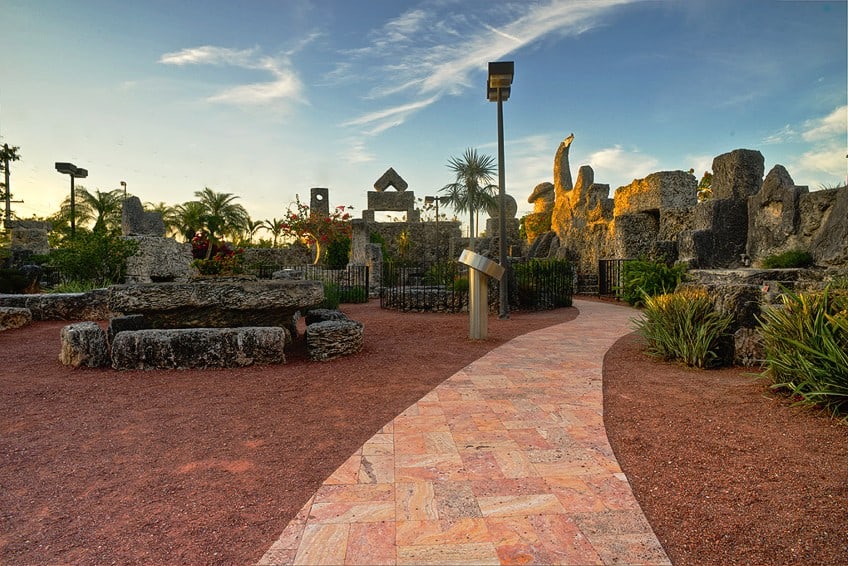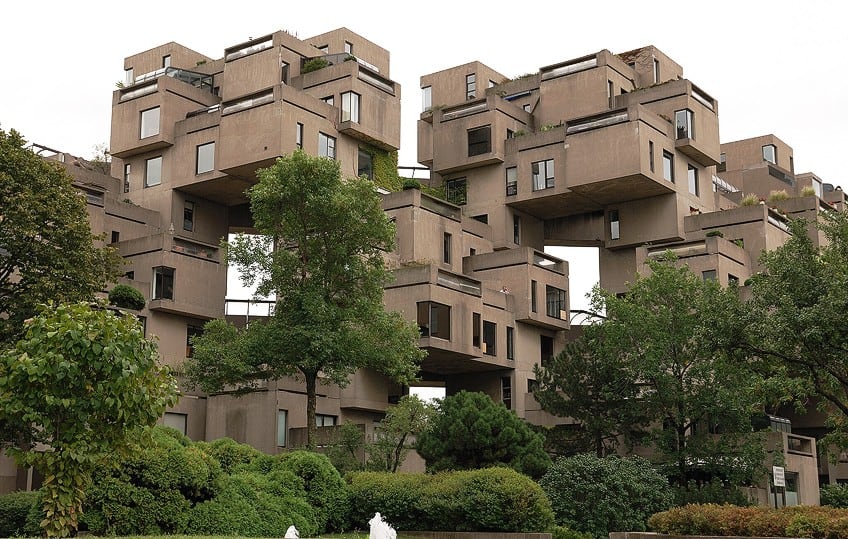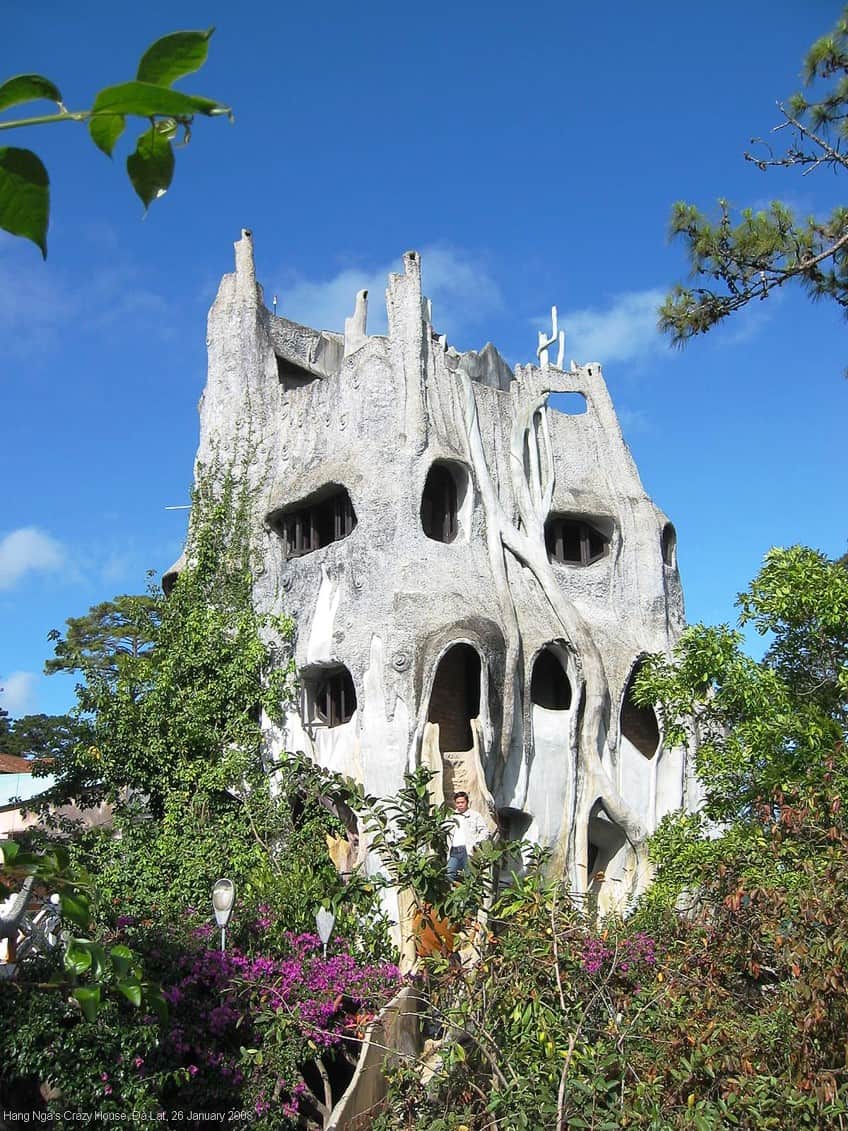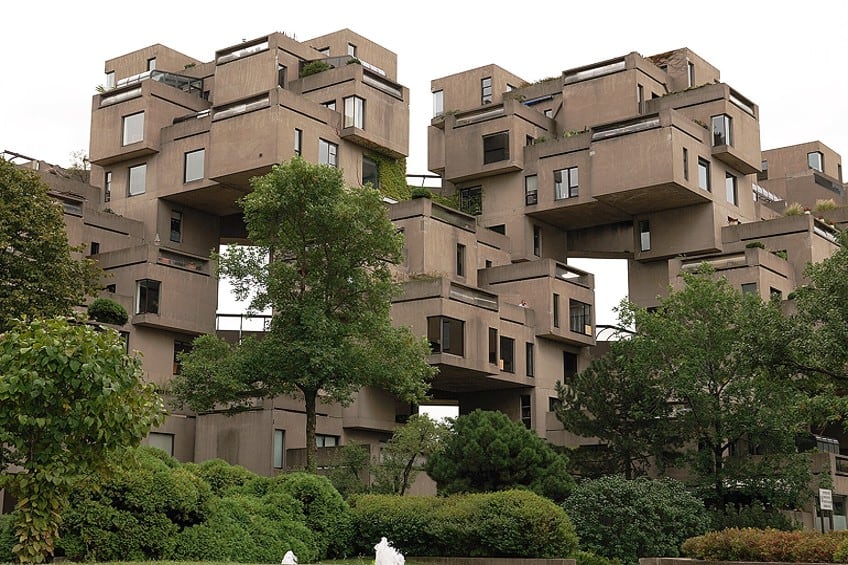Strangest Houses – Tour the Weirdest Houses in the World
Architecture comes in so many forms, and some of those forms are rather strange to most people. The weirdest houses in the world are just as deserving of our attention as the more traditionally or beautifully constructed ones. In this article, we will examine ten of the weirdest homes to see what makes such odd houses, such unique houses, and such unusual houses. Keep reading to learn more about the weirdest houses in the world!
Contents
- 1 Ten of the Strangest Houses in the World
- 1.1 Coral Castle (1923 – 1951) in Miami
- 1.2 The Kettle House (1960s – 1970s) in Galveston Island
- 1.3 Habitat 67 (1965 – 1967) in Montreal
- 1.4 The Cosmic Muffin (1969 – 1974) in Fort Lauderdale
- 1.5 Hằng Nga Guesthouse (1990 – Present) in Đà Lạt
- 1.6 Star Trek: Voyager Flat (2000s) in Hinckley
- 1.7 The Urban Cactus (2006 – 2008) in Rotterdam
- 1.8 Toilet Shaped House (2007 – 2009) in Suwon
- 1.9 Heliodome (2007 – 2011) in Cosswiller
- 1.10 Lego House (2009) in Surrey
- 2 Frequently Asked Questions
Ten of the Strangest Houses in the World
We live in a world filled with very traditionally designed buildings. Every major architectural style is relatively traditional in its overall application, such as Gothic architecture’s dedication to monumental height, Neoclassical architecture’s dedication to an emulation of Ancient Roman styles, and Modern architecture’s desire for function over aesthetic presentation. However, all of these styles and more, regardless of how subversive they are at the time, eventually become rather common. The same is not true of some of the houses we will be discussing below.
We will look at houses that make use of some of the strangest architecture. These houses do not all necessarily conform to any established style, but some of them do.
There are certain architectural styles that are, quite simply, strange to the average person. Many of these architectural styles also often fall under the general purview of Postmodern architecture, but that is not necessarily the case in this article. Lastly, before we get to the strange houses discussed below, we will be using the term “house” in a somewhat loose capacity that refers to residences rather than what may be traditionally considered to be a house. So, with that out the way, let’s have a look at some of the most unusual homes ever constructed.
Coral Castle (1923 – 1951) in Miami
| Architect | Edward Leedskalnin (1887 – 1951) |
| Date Constructed | 1923 – 1951 |
| Function | Museum |
| Location | Miami, Florida, United States |
 Inside the Coral Castle in Homestead Florida; Barry haynes, CC BY-SA 3.0, via Wikimedia Commons
Inside the Coral Castle in Homestead Florida; Barry haynes, CC BY-SA 3.0, via Wikimedia Commons
The Coral Castle is a fascinatingly unusual house that can be found in Miami. This structure cannot be termed a house in the contemporary sense as it has not actually been used as a residence since the death of the architect, but it was used as such by him. The man who built it all was Edward Leedskalnin. This man was considered to be a rather strange and eccentric person by the community at large. The thing that sets the Coral Caste apart is that it is a structure absolutely full of statues and carvings made out of coral rock. No one was aware of the project until after Leedskalnin’s death. He had no formal training, but he collected, sculpted, and set the rocks and statues himself. Everything is made out of coral rock, and the structure as a whole has, today, become a tourist destination.
The Kettle House (1960s – 1970s) in Galveston Island
| Architect | Clayton E. Stokley (1922 – 2005) |
| Date Constructed | 1960s – 1970s |
| Function | House |
| Location | Galveston Island, Texas, United States |
The Kettle House is a particularly unusual house design, and it is another of the houses on this list of the strangest houses in the world that was designed and constructed by the same person who owned it. In this case, it was a man named Clayton E. Stokley. This man was a veteran of the Second World War, and he decided to buy up a steel sphere from his own company so that he could use it as its own storefront.
The house itself was mostly built by Stokley himself, but he also received help from friends and family. It was essentially a small family and friends project that they could all do together. Today, it serves as a rental location for holiday getaways. It is quite small but has two bedrooms, a bathroom, a deck, a living room, and a kitchen. It has also been featured on a number of television shows over the years and has even made its way onto Airbnb as a location that can be rented for a short duration.
Habitat 67 (1965 – 1967) in Montreal
| Architect | Moshe Safdie (1938 – Present) |
| Date Constructed | 1965 – 1967 |
| Function | Housing complex |
| Location | Montreal, Canada |
Habitat 67 is one of the many structures designed by the noted Israeli-Canadian architect, Moshe Safdie. However, this was one of the very first things that he actually designed. Interestingly, it was designed for his master’s thesis. There are not many structures that have become so notable that can claim an origin like that. This now famous housing complex is located in Quebec. The housing complex itself is made up of 146 separate residences. Each of these residences is made up of a different size, overall shape, and internal configuration. Each of these is then linked together. Each of the concrete units is arranged in a seemingly random arrangement to produce a particularly unique and strange design that sees each of them rising high into the sky.
 Full view of Habitat 67 in Montreal; Taxiarchos228, CC BY-SA 3.0, via Wikimedia Commons
Full view of Habitat 67 in Montreal; Taxiarchos228, CC BY-SA 3.0, via Wikimedia Commons
The Cosmic Muffin (1969 – 1974) in Fort Lauderdale
| Architect | Ken London (20th century) |
| Date Constructed | 1969 – 1974 |
| Function | Houseboat |
| Location | Fort Lauderdale, Florida, United States |
The Cosmic Muffin, aside from having one of the most delightful names that have ever been given, is a structure that was designed by the same man who owned the property, Ken London. This Florida resident decided to do something quite unique after he bought an old plane and then slowly but surely transformed it into a houseboat. He turned a thing that should never touch the water for fear of sinking, into something that lives exclusively on the water. The initial idea was for the new houseboat to serve as a recycling project, but it has since become a museum in its own right. It contains some of the amenities that one might expect in a bachelor pad of sorts, as it has a lounge, bar, and a couple of bunk beds. It can also be chartered for trips and can even be toured by those who are interested in having a look at one of the most unusual homes ever constructed.
Hằng Nga Guesthouse (1990 – Present) in Đà Lạt
| Architect | Đặng Việt Nga (20th century – Present) |
| Date Constructed | 1990 – Present |
| Function | Guesthouse |
| Location | Đà Lạt, Vietnam |
The Hằng Nga Guesthouse is one of the weirdest homes ever designed. It is located in Vietnam and was actually designed by a more academic architect who obtained his education at the University of Moscow, Đặng Việt Nga. He began construction on this peculiar structure in the early-1990s and it has never actually finished with its construction. So, this is very much an unfinished project at the whim of an architect who wants to design something that is likely far different to the usual projects that architects get saddled with in the real world. Who wants to design normal things, after all?
 Hang Nga’s “Crazy House” in Dalat, Vietnam; Kelisi, CC BY-SA 3.0, via Wikimedia Commons
Hang Nga’s “Crazy House” in Dalat, Vietnam; Kelisi, CC BY-SA 3.0, via Wikimedia Commons
The actual purpose of this particular architectural project is to act as both a tourist attraction and a guesthouse. There are ten separate rooms that are themed after an animal or plant, and they can be toured for a fee. It helps that the structure is located in Đà Lạt, which is a small resort town located in the mountains of southern Vietnam. So, this is the perfect place to go to see some odd rooms arranged in an odd house.
Star Trek: Voyager Flat (2000s) in Hinckley
| Architect | Tony Alleyne (Unknown) |
| Date Constructed | 2000s |
| Function | Apartment |
| Location | Hinckley, United Kingdom |
The Star Trek: Voyager Flat was the personal project of an English resident named Tony Alleyne. He spent over ten years of his life slowly but surely turning his regular apartment into a location that was purely dedicated to the famous science fiction show Star Trek: Voyager. The apartment was only really discovered when it was put up for sale, and the various features came to light because of it. The property was made up of voice-activated lighting, its own flight deck, and recreations of transporters from the show, and it only took thousands upon thousands of pounds to renovate the apartment.
His work was not dismantled after he finished with it, and it has become one of the major attractions associated with it as a purchasable property.
The Urban Cactus (2006 – 2008) in Rotterdam
| Architect | UCX Architects |
| Date Constructed | 2006 – 2008 |
| Function | Housing project |
| Location | Rotterdam, Netherlands |
The Urban Cactus is a particularly strange housing complex from the mid-to-late-2000s, and it was intended more as a housing project than as a single home. However, it does have a distinctly strange look that does lead to it being one of the more unique homes ever designed.
It is arranged as a residential tower in which each apartment contains its own garden.
For this garden-oriented approach, it has a similar general design to the kinds of vertical gardens that have become a more common form of organic architecture in recent years. And with 98 separate apartments, there is quite a significant number of units to allow people to have both a view and a beautiful garden high above ground level.
Toilet Shaped House (2007 – 2009) in Suwon
| Architect | Sim Jae-Duck (1939 – 2009) |
| Date Constructed | 2007 – 2009 |
| Function | House |
| Location | Suwon, South Korea |
The Toilet Shaped House is, by far, one of the weirdest homes ever designed, and, to be perfectly frank, the name of the house probably says it all. This house is made to look like a toilet. It has a wide rim and a dipped inner section, and the roof is even painted white to make it look like a porcelain toilet bowl. The immediate question you may then ask is this: why on earth would someone make a house that looks like a toilet?
The answer to this question is rather simple. The architect of the house is also a former mayor, a man by the name of Sim Jae-Duck. Other than serving as a politician, he has also spent his life as a sanitation activist who has advocated for better toilets around the world. So, he made this building look like a toilet for that purpose. It is now used as a museum and educational facility that shows off the latest in toilet technology and various exhibits that show off toilets from around the globe. It may not be used as a residence, but it certainly is one of the weirdest things ever designed.
Heliodome (2007 – 2011) in Cosswiller
| Architect | Eric Wasser (Unknown) |
| Date Constructed | 2007 – 2011 |
| Function | House |
| Location | Cosswiller, France |
The Heliodome is a fascinating structure and one of the most odd houses ever designed. It was designed by an eco-house designer named Eric Wasser, and he designed this building as both his personal residence and as a proof of concept for the wooden framed structure that actually rotates based on the sun’s position. This allows the house to be naturally heated and cooled. The interior of the house is more ordinary. It has the usual necessities, such as a few bedrooms, a kitchen, a bathroom, and a terrace. It is also an ecologically designed structure that makes use of a geothermal system, solar panels for electricity production, and even rainwater collectors to minimize the carbon footprint of the house in general.
Lego House (2009) in Surrey
| Architect | Duncan Titmarsh (20th century – Present) |
| Date Constructed | 2009 |
| Function | House |
| Location | Surrey, United Kingdom |
The Lego House in Surrey is actually a house that technically, sadly, no longer exists. It was eventually pulled down, but when it was completed, it contained a working bath, plumbing, toilet, and even a Lego-based bed. It was essentially the kind of structure that every kid wishes they could build but then you inevitably run out of blocks so you can’t keep going. However, the man who had this house designed had the money and the helpers to see to it that it was completed. The house was built by James May, one of the hosts of Top Gear, and over a thousand additional helpers who turned up to build a house made out of actual Lego bricks in the middle of a wine estate. The completed structure was made of over 3 million genuine Lego bricks, and it was also designed without the assistance of Lego itself (and they were reportedly a little annoyed to not be involved in its creation).
We have come to the end of our discussion about the strangest houses in the world. We have examined ten of the most unusual houses, the most unique houses, and the most odd houses. There are many more such buildings out in the world, and they are all worth a good perusal. Hopefully, you’ve learned a good deal about some of the weirdest houses in the world, but go look for some more, because there are many more out there!
Frequently Asked Questions
What Is the Strangest House in the World?
Strangeness is, sadly, a highly subjective concept and so there is no way to definitively state whether a particular house is the strangest in the world. However, houses such as the Star Trek Voyager House, which is designed to look like the eponymous fictional ship, or the Coral Castle in Florida, which was carved by hand with coral, are perhaps some of the best contenders for the most unusual home in the world. This is, as mentioned, impossible to state with certainty though as anyone could simply disagree.
Which Architectural Style Is Considered the Strangest?
When we think of strange architecture, we often reveal our more traditional sensibilities. Some of the most famous forms of strange architecture can include things like Blobitecture, which is a form of architecture that emulates blob-like and organic shapes, or Deconstructivist architecture, which is a form that explicitly rejects functionality in favor of producing a strange contemporary form. However, the mantle of strangest architectural style may go to Duck architecture, which is the name given to the style that tries to copy items, such as having a duck-shaped building.
Which Is the Strangest Example of Impossible Architecture?
Impossible architecture is an interesting concept as it refers to architectural forms that are strange by virtue of them being impossible to create. These could be made through non-Euclidian geometry or impossibly monumental scale. Figures like M.C. Escher produced images that can be seen as impossible forms of architecture, as they would have no means of necessarily being produced or used.
Where Are the Most Unusual Buildings?
Strange and unusual architecture is not confined to any one place in the world as there are strange buildings throughout the globe. Many of these are explicitly designed to be strange. Perhaps the location best known for its strange architecture is Las Vegas, which even influenced the Postmodern architecture of figures like Venturi. Various locations across the United States also include structures intentionally made to be weird, like the tallest thermometer or buildings made to look like dinosaurs.
Which Architects Are Known for Designing the Strangest Houses?
Depending on which architectural styles are deemed the strangest, a figure like Frank Gehry, whose work is often Deconstructivist in general execution, could be considered the most famous strange architect. However, there are many other figures, like Javier Senosiain and his organic architectural forms and Antti Lovag and his bubble-like structures, who could be considered some of the most famous practitioners of strange architecture.
Justin van Huyssteen is a writer, academic, and educator from Cape Town, South Africa. He holds a master’s degree in Theory of Literature. His primary focus in this field is the analysis of artistic objects through a number of theoretical lenses. His predominant theoretical areas of interest include narratology and critical theory in general, with a particular focus on animal studies. Other than academia, he is a novelist, game reviewer, and freelance writer. Justin’s preferred architectural movements include the more modern and postmodern types of architecture, such as Bauhaus, Art Nouveau, Art Deco, Brutalist, and Futurist varieties like sustainable architecture. Justin is working for artfilemagazine as an author and content writer since 2022. He is responsible for all blog posts about architecture.
Learn more about Justin van Huyssteen and about us.
Cite this Article
Justin, van Huyssteen, “Strangest Houses – Tour the Weirdest Houses in the World.” artfilemagazine – Your Online Art Source. July 4, 2023. URL: https://artfilemagazine.com/strangest-houses/
van Huyssteen, J. (2023, 4 July). Strangest Houses – Tour the Weirdest Houses in the World. artfilemagazine – Your Online Art Source. https://artfilemagazine.com/strangest-houses/
van Huyssteen, Justin. “Strangest Houses – Tour the Weirdest Houses in the World.” artfilemagazine – Your Online Art Source, July 4, 2023. https://artfilemagazine.com/strangest-houses/.



